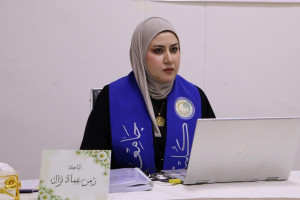
A joint scientific research study by lecturers from the College of Engineering, University of Basra, was published in a prestigious international journal.
Professor Dr. Amjad Zaki Khalil and Professor Dr. Asaad Ghaleb Al-Asadi, lecturers at the College of Engineering, University of Basra, published a scientific research paper titled "Construction 5.0 and Sustainable Neuro-responsive Habitats: Integrating the Brain–Computer Interface and Building Information Modeling in Smart Residential Spaces" in the Journal of Global Sustainability, ranked Q1 on Scopus.
This study adopts a unique approach by investigating the integration of brain-computer interfaces (BCIs) with building information modeling (BIM) in residential architecture. The study explores the combined potential of these two technologies in promoting sustainable, neuro-responsive environments within the framework of Construction 5.0.
Methodology
The methodological approach relies on real-time analysis of BCI data, along with subjective assessments of residents' experiences, to elucidate cognitive and emotional states. This data is used to guide BIM-driven modifications, facilitating the creation of adaptable, customized, and sustainable architectural solutions.
Results
The results highlight the potential of BCI-BIM integration to develop dynamic environments that respond to occupant demands, enhancing well-being, energy efficiency, and reducing environmental impact.
Main Contribution
The primary contribution of this work is to demonstrate the feasibility of neuro-responsive architecture, where cognitive input from brain-computer interfaces enables real-time modifications to architectural designs. This technology enhances the flexibility and user-centered quality of the built environment by incorporating occupant preferences and mental states into the design process.
Implications and Conclusions
Furthermore, the integration of BCI and BIM technologies has significant implications for enhancing sustainability and facilitating the design of energy-efficient and environmentally responsible residential areas. This study provides practical insights for architects, civil engineers, and construction professionals, presenting a methodology for implementing BCI-BIM systems to improve user experience and promote sustainable design practices. The research also discusses ethical issues related to privacy and data security







